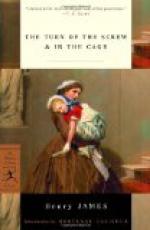She liked having done with them, as she assured herself she had practically done, and the strange thing was that she neither missed the procession now nor wished to keep her place for it. It had become there, in the sun and the breeze and the sea-smell, a far-away story, a picture of another life. If Mr. Mudge himself liked processions, liked them at Bournemouth and on the pier quite as much as at Chalk Farm or anywhere, she learned after a little not to be worried by his perpetual counting of the figures that made them up. There were dreadful women in particular, usually fat and in men’s caps and write shoes, whom he could never let alone—not that she cared; it was not the great world, the world of Cocker’s and Ladle’s and Thrupp’s, but it offered an endless field to his faculties of memory, philosophy, and frolic. She had never accepted him so much, never arranged so successfully for making him chatter while she carried on secret conversations. This separate commerce was with herself; and if they both practised a great thrift she had quite mastered that of merely spending words enough to keep him imperturbably and continuously going.
He was charmed with the panorama, not knowing—or at any rate not at all showing that he knew—what far other images peopled her mind than the women in the navy caps and the shop-boys in the blazers. His observations on these types, his general interpretation of the show, brought home to her the prospect of Chalk Farm. She wondered sometimes that he should have derived so little illumination, during his period, from the society at Cocker’s. But one evening while their holiday cloudlessly waned he gave her such a proof of his quality as might have made her ashamed of her many suppressions. He brought out something that, in all his overflow, he had been




